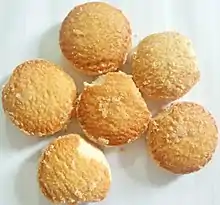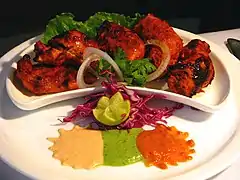Nankhatai
Nankhatai (Bengali: নানখাতাই, Hindustani: नानख़टाई (Devanagari) / نان خطائی (Urdu)/ Ghanakatha (Sinhala)) are shortbread biscuits originating from the Gujarat region of the Indian subcontinent, popular in Northern India, Pakistan, Bangladesh, Sri Lanka, and Myanmar (formerly Burma).[1]
 | |
| Alternative names | Kulcha-e-Khataye |
|---|---|
| Type | Shortbread |
| Region or state | Khorasan Afghanistan |
| Associated cuisine | [[Afghanistan cuisine|Indian]], Bangladeshi, Pakistani |
| Main ingredients | Wheat flour, Rice flour, Butter, Powdered Sugar, Milk/Yogurt, Salt, Honey, Baking Powder |
Etymology
The word nankhatai is derived from the Persian word naan meaning bread and khatai from a Dari Persian word meaning biscuit.[2][3] Nankhatai has been borrowed into the Burmese language as nankahtaing (နံကထိုင်). It is called by "NaanaHatha" (நானஹத்தா) in Tamil language in East Tamil Nadu & "Gnanakathaa" ( ඤාණකතා) in The Sinhala Language in Sri Lanka.[4] In Afghanistan and Northeast Iran, these biscuits are called kulcha-e-khataye. Kulcha is a type of Afghan, Iranian and Indian bread similar to naan.[5]
History
Nankhatai is believed to have originated in Surat in the 16th century, when Dutch and Indians were the important spice traders. A Dutch couple set up a bakery in Surat to meet the needs of local Dutch residents. When the Dutch left India, they handed over the bakery to an Iranian.[6] The bakery biscuits were disliked by the locals. To save his business he started selling dried bread at low prices. It became so popular that he started drying the bread before selling it. With time, his experimentation with bread inspired him to ultimately invent nankhatai.[2][3] The main ingredients in nankhatai are refined flour, chickpea flour and semolina.[7] Some other traditional nankhatai recipes do not use chickpea flour.[8]
References
- "Bakeri launches Nankhatai with packaging that makes waves". Aurora. Archived from the original on 2015-04-30.
- "Nankhatai - The Dying Indian Biskoot - NDTV Food". Food.ndtv.com.
- "Nankhatai Cookies With Rose And Chai Spices Recipe". Food.com. 17 February 2015. Archived from the original on 6 October 2017. Retrieved 6 October 2017.
- Myanmar-English Dictionary. Myanmar Language. Sri Lanka in Sinhalese language it noun as "Gnaanakathaa" ( ඤාණකතා).Commissionnn. 1996. ISBN 1-881265-47-1.
- "What is the difference between Kulcha and Naan". Chefinyou.com.
- "About Nankhatai". Ifood.tv. Retrieved 17 August 2018.
- "Ingredients of Nankhatai". flavourhome.com. 3 June 2020. Retrieved 10 June 2020.
- Anwar, Madeeha (Feb 2022). "Now Delish". Now Delish.
- Delish, Now (Feb 2022). "Now Delish".


